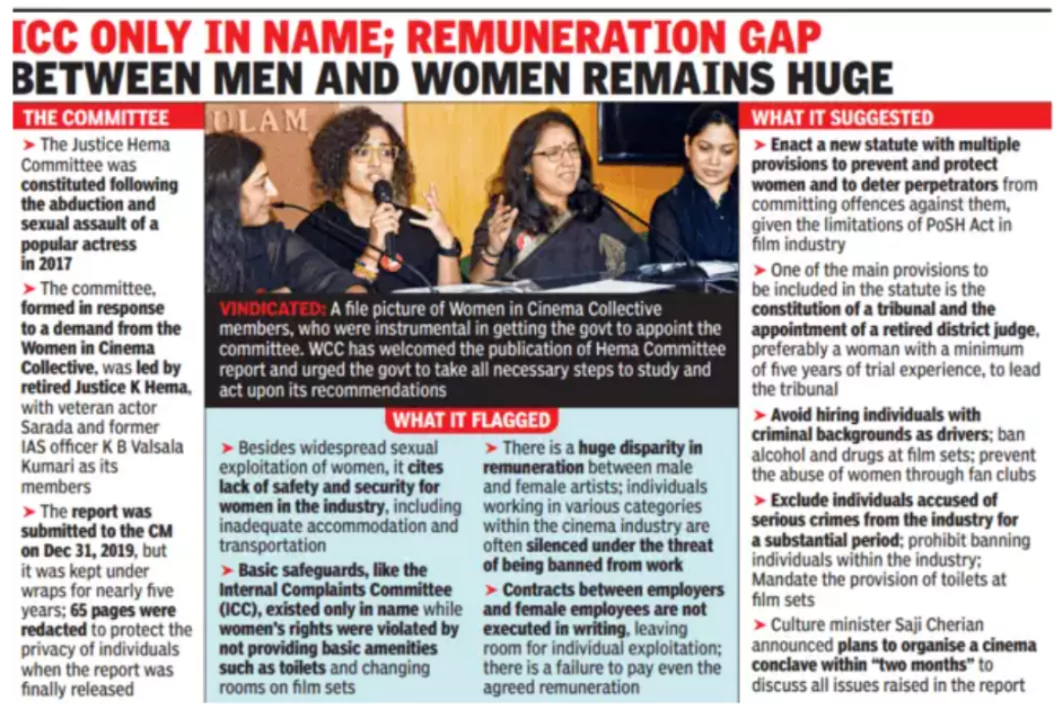Recently, the K. Hema Committee report has been published on the issues faced by women in the Malayalam film industry.
Key Findings of the Hema Committee Report
As per the report, following issues faced by women in the Malayalam film industry are given below:

- Sexual Demands: These are made to women from the time they enter the industry.
- The committee confirms the rumoured existence of the practice of “casting couch” in the industry.
- The casting couch is a euphemism for the practice of soliciting sexual favours from a job applicant in exchange for employment in the entertainment industry, primarily acting roles
- Harassment and Torture: Sexual harassment, abuse, and assault against women take place at the work place, during transportation, and at places of accommodation.
- Online harassment
- Women are tortured if they express resentment or unwillingness to fulfil sexual demands.
- Lack of Facilities and Safety: A lack of basic facilities for women, including toilets and changing rooms at places of work, especially in outdoor locations, leading to urinary infection for many women.
- Women lack safety at their workplace and accommodation.
- Ban and Silence: Unauthorised and illegal banning of individuals in cinema.
- The silencing of women under the threat of banning them from working in the industry.
Enroll now for UPSC Online Classes
- Discrimination: Male dominance, gender bias and gender discrimination.
- Disparity of remuneration between men and women, and gender discrimination in remuneration.
- Junior artists are in some cases “treated worse than slaves” with work extending up to 19 hours.
- Indiscipline: The use of drugs and alcohol, disorderly conduct and misbehaviour at place of work, which lead to gross indiscipline.
- Comments: Being subject to demeaning or vulgar comments at places of work.
- Non-execution of Contracts: Between employer and employee to suit individual requirements.
- Fail on Remuneration: The failure to pay the agreed remuneration.
- The lack of a written contract is exploited by some to deprive the actors and technicians of even the remuneration promised orally.
- The junior artists lack a minimum remuneration.
- Resistance/Reluctance: To allow women to work on the technical side of cinema.
- Legal Issues: Lack of legal awareness about their own rights.
- The absence of any legally constituted authority to redress their grievances.
- Concerns Raised:
- Ineffectiveness on Internal Complaints Committee (ICC): The Hema Committee notes that an ICC can be ineffective as powerful persons can threaten or coerce the ICC members to deal with the complaint in a manner they demand.
- Confidentiality: It also raises doubts about the confidentiality of information revealed to the ICC, if it is constituted with people from the industry, adding to the torture of the complainants.
- Recommendation: The committee recommends the government to enact an appropriate statute and constitute a Tribunal to address all the issues faced by women in cinema.
Legal Framework to Combat Sexual Assault in India
Following are the various legal framework to deal with the issue of sexual assault in India:
- Indian Penal Code (IPC) Provisions:
- Section 375: Defines what constitutes rape, including non-consensual sexual intercourse with a woman.
- Section 376: Specifies punishments for rape, ranging from fines to life imprisonment, depending on the case’s severity.
- Section 376A: Covers cases where rape results in death or a persistent vegetative state, with stricter penalties.
- Section 376B: Addresses marital rape, but this section does not cover all forms of marital rape.
- Section 354: Deals with assault or criminal force intended to outrage a woman’s modesty.
- Protection of Children from Sexual Offences (POCSO) Act, 2012:
- Scope: Protects children from sexual crimes like assault, harassment, and pornography.
- Punishment: Imposes severe penalties, including long prison terms and fines, for offenders.
- Criminal Law (Amendment) Act, 2013:
- Enhancements: Expanded the definition of rape and introduced new crimes related to sexual violence following the Delhi gang rape case.
- New Offenses: Includes crimes like stalking, voyeurism, and acid attacks, with specific punishments.
- Sexual Harassment of Women at Workplace (Prevention, Prohibition and Redressal) Act, 2013:
- Scope: Protects women from sexual harassment at work.
- Mechanism: Requires workplaces to set up Internal Complaints Committees (ICCs) to handle harassment complaints.
- Aggrieved Woman:
- An “aggrieved woman” includes any female who alleges sexual harassment by a respondent.
- This definition applies to both employed women and those in dwelling places.
Check Out UPSC NCERT Textbooks From PW Store
![]() 20 Aug 2024
20 Aug 2024

